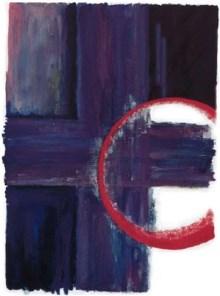The seven last words of Jesus on the cross
seven paintings and meditations
 Mystic Wood by France White, SHCJ © 1996
France White, SHCJ
Mystic Wood by France White, SHCJ © 1996
France White, SHCJ

seven paintings and meditations
 Mystic Wood by France White, SHCJ © 1996
France White, SHCJ
Mystic Wood by France White, SHCJ © 1996
France White, SHCJ

seven paintings and meditations
Produced at WhiteCottage Epiphanies
by France White, shcj
© 2006 by SHCJ all rights reserved
An innocent person who is sentenced to death is symbolized in these paintings by a radiant red sphere; the paintings also incorporate the method of execution – a cross. In a spectrum of compassion and agony, the cross pierces, fades, enfolds, vibrates, dominates and disappears. Forgiveness is called down like dew on dried ground. Bright paradise is promised. Comfort is offered to companions and parent. A cry of thirst and the despair of feeling deserted culminate in serene surrender. And then – it is accomplished; eternity is embraced.
Commentary on the paintings.
When I decided to paint the seven last words, I first contemplated the words as they appear in the four Gospels seeking to feel with Jesus. No Gospel has all seven of the words; some of the words appear in more than one Gospel, and others are only in one. So after being in the words, I decided what order felt most like the progression of events and emotions.
I made a variety of thumb-nail sketches and after some time decided that Jesus would be represented in each painting by a circle, and that each Word would also contain the cross. Finally, having simplified each painting to a circle, a cross and what is not-cross, I decided to use color to carry the emotional content:
- a red circle for Jesus – red for his life blood
- the color spectrum to carry the emotional content
I asked, what are the emotions and atmosphere of each word? Then, what color best carries that emotion? So the predominant color of each painting moves through the spectrum starting with green, then yellow on through blue.
The meditations explore the emotional content of Jesus’ last hours. The Gospels say that Jesus spoke seven times while he hung dying on the cross. Each time he spoke has been called a “word”.
In each “word” you will have the opportunity to reflect on three things:
the scripture with the words of Jesus,
your own personal experience in order to place yourself close to Jesus and try to enter his experience,
a painting which is a visual interpretation of Jesus’ words.
the “words” OR paintings – HOW THEY DEVELOPED BEFORE OR DURING THEIR CREATION – THE PART THAT COLOR and THE CIRCLE PLAYED


First word: FORGIVE
In this painting I tried to express that when one really forgives and leaves the offense in the past it cuts through a lot, and can cut with pain. Notice how the cross cuts through the circle…



Forgiveness is like water on dry ground so the use of green, the color of living things, the color of hope.
Second word: YOU WILL BE WITH ME IN PARADISE
See what happens in this painting with the red circle and the cross. Jesus has promised paradise to the criminal has promised, “you will be with me”. He has brought that brightness to the other, responding to the other’s kindness.
Third word: THIS IS YOUR SON / MOTHER
What happens to the Christ circle here? Its edges are red – that is the Christ but the center is orange (the color of this word) Jesus just told his beloved disciples that they are to be him for his mother And the cross is the color that is traditionally used for Mary, the mother; the cross is the mother’s pain
Fourth word: I THIRST
In designing this word, I wanted the thirst to be intense, to throb, to be hot.
Fifth word: WHY HAVE YOU ABANDONED / FORSASKEN ME
The color of this work is the color of Lent . . .

and the red circle has become only an edge; it is as empty as the feeling of being abandoned. The abandoned / forsaken person feels empty – not there.
Sixth word: INTO YOUR HANDS I COMMEND MY SPIRIT
Once again the circle is but a red line yet it is full of brightnessthe brightness and relief of trust

The cross can only be seen by the peacefulness that surrounds it. It is quiet as a whisper.
Seventh Word: IT IS ACCOMPLISHED What has happened to the red Christ circle?
See how eternity is embraced! Now, all is Jesus, all are in Jesus; Jesus is in all.
These meditations invite you to explore the emotional content of Jesus’ last hours and to seek out your own experience of the same or similar emotions.
First, look at his innocence and enter into it.
Have you ever been accused of something and known that you were innocent?
Have you ever had to accept and live with the false judgment of others?
Have you ever had your intentions or motives misunderstood so that you were blamed for something when you actually were trying to do something positive?
Have you had to accept and live with people thinking or saying something about you that is not true?
If you have ever been blamed when innocent, then in some way, small or large, you have shared in the experience of Jesus, who though innocent, took on the guilt, the sins of the world when he died on the cross.
“Abba, Loving God, forgive them.”
When they reached the place called The Scull, they crucified Jesus there and the two criminals also, one on the right, the other on the left. Jesus said,

“Abba, loving God, forgive them; they do not know what they are doing.”
(Luke 23:33, 34)
© France White, SHCJ - 1988When they reached the place called The Scull, they crucified Jesus there and the two criminals also, one on the right, the other on the left. Jesus said, “Abba, loving God, forgive them; they do not know what they are doing.” (Luke 23:33, 34)
Reflect on the words and the image and consider
a time when you forgave someone or a time you were forgiven
Have you ever refused to forgive someone or something?
Have you ever tried to reach forgiveness and been unable to forgive?
Have you ever offered forgiveness and your offer was refused or ignored?
Do you consider anything “unforgivable” in your dealings with others?
In your experience, how do “unacceptable” and” unforgivable” differ? How are acceptance and forgiveness alike?
How can you bring these questions to your relationships? to your perspective on local, national or international events? on parish or Church events? on the “war on terrorism”?
“Today you will be with me in Paradise.”
One of the criminals hanging there abused Jesus. “Are you not the Christ?” he said. “Save yourself and us as well.” But the other spoke up and rebuked the first saying, “Have you no fear of God at all? You got the same sentence as he did, but in our case we deserved it: we are paying for what we did. But this man has done nothing wrong. Jesus,” he said, “remember me when you come into your reign.”
Jesus replied,

“Indeed, I promise you, today you will be with me in paradise.”
(Luke 23:39-43)
© France White, SHCJ - 1988One of the criminals hanging there abused Jesus. “Are you not the Christ?” he said. “Save yourself and us as well.” But the other spoke up and rebuked the first saying, “Have you no fear of God at all? You got the same sentence as he did, but in our case we deserved it: we are paying for what we did. But this man has done nothing wrong. Jesus,” he said, “remember me when you come into your reign.” “Indeed, I promise you,” Jesus replied, “today you will be with me in paradise.” (Luke 23:39-43)
How have you encouraged another person’s goodness?
How have others encouraged you to be kind? Who helped you learn that; what were the circumstances?
Do you ever taunt or make fun of another person? How do you feel when someone mocks another person?
What patterns or habits in your interactions with others bring you feeling closer to the promise of paradise on a daily basis, are there any that leave you feeling far away from the promise of paradise?
Think about a person who is a thorn in your side: how does your attitude promise paradise for this person or make it seem farther away?
How can you learn to “promise paradise” to others, in your family, in your neighborhood, in your place of work?
“This is your son. This is your mother.” © France White, SHCJ - 1988
Near the cross of Jesus stood his mother and his mother’s sister, Mary the wife of Clopas, and Mary of Magdala. Seeing his mother and the disciples he loved standing near her, Jesus said to his mother,

“Woman, this is your son.”
Then to the disciple he said, “This is your mother.”
And from that moment the disciple made a place for her in his home.
(John 19:25-27)
Near the cross of Jesus stood his mother and his mother’s sister, Mary the wife of Clopas, and Mary of Magdala. Seeing his mother and the disciples he loved standing near her, Jesus said to his mother, “Woman, this is your son.” Then to the disciple he said, “This is your mother.” And from that moment the disciple made a place for her in his home. (John 19:25-27)
If you knew that you were dying, how would you deal with the pain it caused your family and friends?
How do you reach out to others who experiences pain or loss?
What encourages you to “make a place in your home” – in your attitudes and heart – for people or a culture different from you? How can we become “family”?
How do you feel about the extent of the war on terrorism that the US administration launched as the answer to the pain and loss of September 11, 2001?
What actions of reconciliation do you hope for, dream of, deeply desire?
What have you been able to do?
“I thirst.”
After this, Jesus knew that everything had now been completed, and to fulfill the scripture perfectly he said:
“I am thirsty.”
(John 19:28)
 © France White, SHCJ - 1988
© France White, SHCJ - 1988
After this, Jesus knew that everything had now been completed, and to fulfill the scripture perfectly he said: “I am thirsty.” (John 19:28)
Was the thirst of Jesus physical? Spiritual? Emotional?
What have been your thirsts, your desires, your hopes?
What are your thirsts for members of your family? for your friends?
for the neighborhood?
How do you deal with “thirsty” people?
With one who is thirsty for friendship?
With one who is thirsty for attention?
With one who is thirsty for success?
With one who is thirsty for revenge?
How thirsty are you for good? For God?
“My God, my God, why have you forsaken me?”
© France White, SHCJ - 1988
When the sixth hour came there was darkness over the whole land until the ninth hour. And at the ninth hour Jesus cried out in a loud voice,
“My God, my God, why have you forsaken me?”
(Matthew 27:45-50, Mark 15:33-34)
When the sixth hour came there was darkness over the whole land until the ninth hour. And at the ninth hour Jesus cried out in a loud voice, “My God, my God, why have you forsaken me?” (Matt. 27:45-50, Mark 15:33-34)
Reflect on the words and the image and consider
What would it be like to feel abandoned, forsaken, forgotten by God?
by another person or by a group?
by a loved one?
Are you ever an outcast – an outsider, one abandoned or ignored?
Are there “outcasts” – people abandoned, rejected, ignored – among your friends or in your church or parish or neighborhood, because of race, religion, sexual orientation, class, ability, personality, attitudes, habits, the amount of money they have, their physical appearance?
Have you ever been kind to or befriended an outsider? How were you able to do this?
Is there anyone with whom you don’t like to associate? Does everyone feel the same?
How do you show it?
What can you do so that person doesn’t feel outside?
It was now about the sixth hour and, with the sun eclipsed, a darkness came over the whole land until the ninth hour. The veil of the Temple was torn right down the middle; and when Jesus had cried out in a loud voice, he said,
(Luke 23:44-46)
 “Into your hands I commend my spirit.”
© France White, SHCJ - 1988
“Into your hands I commend my spirit.”
© France White, SHCJ - 1988
“Abba, loving God, into your hands I commit my spirit.”
It was now about the sixth hour and, with the sun eclipsed, a darkness came over the whole land until the ninth hour. The veil of the Temple was torn right down the middle; and when Jesus had cried out in a loud voice, he said, “Abba, loving God, into your hands I commit my spirit.” (Luke 23:44-46)
Reflect on the words and the image and consider
in the face of the cross, in the face of suffering in your life, how have you been able to hand that over to God and surrender to its existence?
In a good sense, when or how do you stop struggling against suffering or disappointment or frustration?
How do you say, “this has happened”, and leave it in God’s hands? How do you abandon yourself to God – to what has been so that what will be – what can be – may happen?
What kinds of struggles with family or friends or with coworkers might lead you to this “word”?
Remember a time when you were really afraid or angry or disappointed.
What would it have been like if you had “committed” that spirit of fear or anger or disappointment to God?
What would happen if your turned over your feelings to God?

“It is accomplished.”©
France White, SHCJ- 1988
After Jesus had taken the vinegar he said, “It is accomplished” and bowing his head he gave up his spirit.
(John 19:29)
After Jesus had taken the vinegar he said, “It is accomplished”; and bowing his head he gave up his spirit. (John 19:29)
Reflect on the words and the image and consider
What does it mean to be finished, to accept that the end has come?
How do you know that you have done all you can in a situation?
When do you let yourself say, “It is done; I’ve done my best, or the best I could at the time”?
How do you help people close to you learn to let go, to say “it is accomplished” and be proud?
When do you say I cannot, should not, will not do any more?
How do you become peaceful in the face of apparent failure or incompleteness? How do you help others attain peace?
I cannot consider the death of Jesus and not be aware that even up to this day, the state condemns people to death just as the Roman state sentenced Jesus to death.
As we enter into the passion and death of Jesus it is appropriate for Christians to examine our stance on capital punishment.
God of compassion, You let your rain fall on the just and the unjust. Expand and deepen our hearts so that we may love as You love, even those among us who have caused the greatest pain by taking life. For there is in our land a great cry for vengeance as we fill up death rows and kill the killers in the name of justice, in the name of peace.
Jesus, our brother, you suffered execution at the hands of the state but you did not let hatred overcome you. Help us to reach out to victims of violence so that our enduring love may help them heal.
Holy Spirit of God, You strengthen us in the struggle for justice. Help us to work tirelessly for the abolition of state-sanctioned death and to renew our society in its very heart so that violence will be no more.